The Garden of Words (2013) Review: A Sprinkle of Drama for a Rainy Day
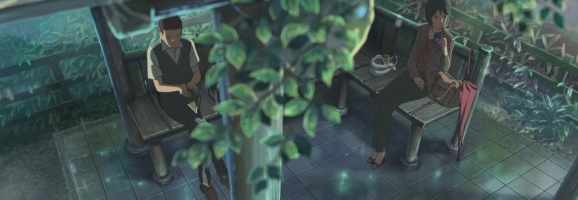
Yes, everyone who has already seen The Garden of Words probably just groaned at my choice of title. Those who didn’t, the amount of time you can spend reading this article you might as well try watch the film. The Garden of Words is the latest installment from director Makoto Shinkai’s of CoMix Wave Films, the ‘master of loneliness’ as I like to call him (please click on the link to see my teaser reviews of his other titles). The 45 minute film is about 15-year-old Takao Akizuki, whom likes to skip school on rainy days and go to a park, where he meets a mysterious older woman! It sounds like it could be a pitch for a romantic comedy title, but it is not. It explores the lonely life of this poor student, and reminds me why high school was such a terrible place. Fan or not, you may be wondering how this compares to others considering how similar the themes are. Is The Garden of Words just regurgitating the ‘same old thing’ we’ve seen previously? The short answer is no. Shinkai’s films often have an element of romance within them, and different romantic pairings have been explored: cats, two lovers separated by time and space, lovers distanced by the progression of time, long distance relationships (real-world sense) and now lovers kept apart by age and professional positions (cue the long ethical discussion). Essentially, it is exploring the same themes in a different way.
What sets this one apart from his other down-to-earth titles like She and Her Cat (1999) and 5 Centimeters per Second (2007) is the script and characters. Considering it is 45 minutes, it doesn’t feel like it drags on too long (like in The Place Promised in Our Early Days (2004) or is rushed. It keeps to the point and knows what it is trying to say. Every scene adds something to the atmosphere and the characters journey. In Place Promised, the male characters liked to build planes. Here, Takao likes to make shoes. He is trying to figure out who he is, deal with a broken family situation and pass school, instead of all his focus just being on the pursuit of a woman. It is a more well-rounded peek into his life. There isn’t much time to develop him beyond that, as the main focus, and the most interesting part of The Garden of Words is Yukino. The only other grown woman Shinkai has had in his short films is the one in She and Her Cat, so it’s a refreshing change, and nostalgic to contrast and compare the two age groups. You could almost see Yukino as a more expansive view of that character. She is mysterious, enigmatic, and it takes time for Akao to develop enough confidence to ask about her life. The climax of the story is when Akao has figured out his opinion on Yuki and her situation, and breaks down. The climax brings up an ethical question of mixing professional with personal life, as well as an age difference, and it is dealt with sensitively and appropriately. Even with Japan’s openness with… obscure relationships, I am glad The Garden of Words didn’t cross that line. It ends on a depressing note, like many of Shinkai’s works, but there is a ray of hope with the line at the end of the credits: “I am going to go visit her”. It reminds us that even though he stuffed up in school that life goes on and he is still keeping in mind what is important to him. He hasn’t, as far as we know, jumped in front of a train or ruined his life.
If we’re comparing his films based on aesthetics, they are all on the same high standard, and it would be wrong to choose which one to watch based on this alone. The animation is fluid and gorgeous as ever with the lighting effects, and the enormous amount of detail in the backgrounds. The focus on nature is similar to 5 Centimeters per Second, and feels more homely than the desolate buildings in sci-fi Place Promised. This appears to be done deliberately. The backgrounds are reconstructions of photos from the famous, popular tourist spot, Shinjuku Gyoen National Garden in Tokyo. They were originally designed for royalty but were damaged in 1945, near the end of the second world war. In an interview from Anime News Network, Makoto Shinkai stated that he is very proud of how beautiful Tokyo can be, and wanted to share its charm and beauty with the audience. The biggest change this time around is the character designs by Kenichi Tsuchiya, which look more mature and real-to-life than previous titles. Takao has a bony, block-face structure which is usually saved for side characters or “the dumb macho guy” in shounen titles (like Toji Suzuhara in Evangelion). Since this is the opposite of a shounen title, it makes the characters seem more realistic and believable, even though they are just drawings. The eyes are not overly big, but still pleasant to look at, which is a plus for those who hate that style of anime drawing.
Makoto Shinkai has always impressed me with the style of music he chooses for his films. In his feature-length titles, Children who Chase Lost Voices and The Place Promised in Our Early Days there has been a large ensemble orchestra to add a punch of power to scenes. Here, Shinkai reverts back to his humble beginnings of Voices of a Distant Star (2003), so it is mostly just a single piano. None the less, it is still enchanting and beautiful. If the style sounds a little different to you, it would be because it was composed by Daisuke Kashiwa, whom (yes, you heard me) isn’t Tenmon, the same composer from every other film Shinkai has ever done. While there are never opening songs with Shinkai’s work, there is a beautiful ending song: “Rain” by Motohiro Hata, an acoustic track with smooth vocals. Like the other ending songs, it is fantastic, catchy and has a beautiful melody. It definitely adds magic to the film. The Japanese acting is great. It shines at the climax of the film, the most emotional scene near the end. I had to try not to sob in the REEL anime cinema screening that I saw. The english dub could have been better, but it is not the acting that is amis. Since the majority is narration, the delivery is believable. Patrick Poole is, but more importantly sounds way too old to be playing a 15-year-old boy. He sounds like he‘s the older brother in the family. It is distracting, as it makes you forget there’s a 10 year age gap between the two leads. Maggie Flecknoe, as you may have guessed, sounds a lot more fitting age-wise in her role, and is almost identical to the Japanese.
For a director whom, like many, recycles similar ideas, he does it very well. The themes of loneliness and longing for others is explored in a very poetic, true to life manner. He takes something incredibly simple and makes it relatable and sympathetic – mostly through exposition of thought. As we all know, loneliness is something akin to being trapped in your own mind – which in turn, makes you feel heavy, sad, and disconnected to reality. In Shinkai’s films, we are often smack bam in the mind of the main characters. It is something many viewers will be able to identify with, and partially is what makes Shinkai’s films so popular. We can all unite in our experiences of loneliness. A mixture of relaxing, nostalgic, touching and heart wrenching, Garden of Words is a noteworthy addition to Shinkai’s growing collection of titles. If I could re-write my previous article, I would put this one at #4, above 5 Centimeters per Second, which would kick “Place Promised in Our Early Days” off the ranking space forever. Story wise, it doesn’t beat Voices of a Distant Star, but it is worth watching even if you have seen all his other films, as it isn’t a step down in quality by any means.
Rating:
What do you think? Leave a comment.





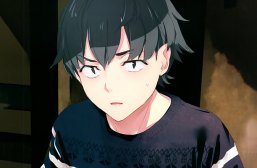

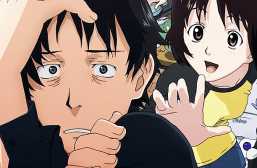
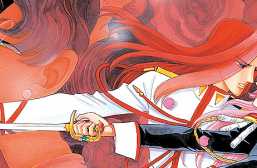
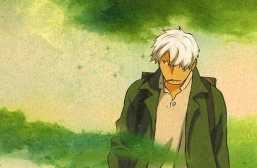
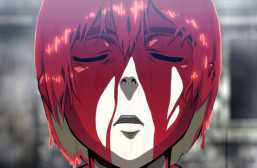
I have watched many of Shinkai’s anime. It is great how the emotions of the characters dwell in the environment around them. The refined use of environment and ambient effects (sound, music, weather etc) contribute greatly to the film’s story.
Thought the ending was slightly disappointing so agree about the four stars.
I thought the ending was better than the one in “children who chase lost voices” – since it actually gave some sort of idea of what happened to the character. Shinkai seems to like leaving his endings open ended though.
What didn’t you like about the ending?
Im a big fan of 5cm and The Place Promissed so will def watch this. Thanks for the review!
Definitely do!
5 centimeter per second is incredible. I think because i can relate to it. I have yet to see this movie, i just found out about it and Shinkai does amazing work so i will of course watch this pretty soon.
I’ve seen most of Makoto Shinkai’s works, so I was trying to prepare myself for his “open & sad endings”. I think the only I didn’t necessarily like about the film is when the two of them confronted one another in the stairs outside of Yukino’s apartment… That scene would’ve totally been perfect… Had the (at least in my opinion) really cheesy music not kicked in. Other than that, this film did not fail to deliver everything that I love about Makoto Shinkai’s work. They stories are generally really simple, but it makes it very realistic & relatable; the awesome visuals help to carry the story along. All in all, a really good film!
Y’all should watch Shinkai’s previous work:
– Hoshi no Koe
– Kumo no Mukou, Yakusoku no Basho
– Byousoku 5 Centimeter
– Hoshi o Ou Kodomo
The first three are a must-see, like Kotonoha no niwa, really beautiful. The last one… well, I started watching it but I dropped it after a few minutes. I don’t know why but I didn’t like it, it was boring, or maybe I was having a bad day. I guess I will give it a second opportunity.
Really hope Shinkai manages to reach the heights of 5 Centimeters Per Second again one day, and maybe go even further. Alas, this is not it.
I personally think that The Garden of Words was far better written than 5 Centimeters per Second – I’m interested to know why you think the oppposite?
This is a great review, love the fact that you talk about the music element within the film. Frankly, I have never watch any of Shinkai’s work, but seeing that everyone here is a big fan of his films, I guess I should really start exploring Shinkai’s world of animation. Thanks for the review.
Totally agree with you on the whole “Master of Loneliness” name!
The ‘Master of Loneliness’is a great, playful name! Your writing really animates the animation you are describing and has provoked me to look further into this genre! Thanks for the insight!
No worries Kathfisher. I’m glad to be of assistance 🙂
Nice essay. Although I have to admit that I was disappointed by Makoto Shinkai’s latest work.
The lack of science-fiction/fantasy elements reveals his shortcomings in terms of character development and dialogue. It looks great, no doubt about it. But I thought the relationship between the boy and teacher seemed artificial and stilted. It was never clear to me, why she should be interested in him in the first place….
Maybe because real love knows no bounds, no time barriers or age limits. And who needs science fiction/fantasy to develop characters? Isn’t our lives already filled with them?
My personal opinion is, this movie is the best anime movie ever even though I liked the climax of 5 centimeters per second much more.
In my opinion, Makoto Shinkai is a master at creating a certain atmosphere (I relate him very much to the Holywood director Sofia Copolla), but is severely limited by his ability to craft a story and to go beyond his comfort zone. I thought that Children Who Chase… was an interesting step (though I disliked the movie), but was disappointed by Garden of Words.
Take for instance his penchant to cop out of endings by putting in a cool Jpop song and creating a musical montage. It’s a lazy way to end a movie, and in my opinion, it was one of the missteps in the otherwise brilliant 5cm/s.
Shinkai needs to collaborate with a writer. I love his moves because of the atmosphere they project, but it is sad to see that his abilities seem to have peaked. I think he can pull a lot of inspiration from people like Richard Linklater (Before Sunrise, After Sunset, Before Midnight, Boyhood), who also tackle issues of relationships, distance, and time.
I just watched The Garden of Words a moment ago; I have to say that I am a 19year old Boy, who is socialy integrated but still loves Romance Animes/ Romance Anime Movies.
The climax for me was when she chased after him, shortly after he left Yukinos flat. It was a really moving scene and you get the feeling that you know both characters really well.
Anyways, thanks for your nice review. I hope this is not outdated.
P.S.: The controversy between Takao and Yukino who actually both love eachother, but have to go they own ways is wonderfull, but I would have liked a more fulfilling ending. A love between Student and Teacher, with a beautiful background story.
I am really happy that I found this movie.
i watched the movie two days ago… reeaallly deppressed by the ending .. would have been happier if there was a scene like 3 years later … when they meet again … even if as friends … it would have been better…
the ending is really depressing
When I finally saw this film, after owning the blu-ray for nearly a year, I was awestruck by the level of detail and color. I would strongly argue that “Garden of Words” is leaps and bounds better looking than any of Shinkai’s previous films, because he has taken every ounce of time and effort that would be spent on a film twice as long (if not longer) and has squeezed it down into a 45 minute time frame. Every character has multiple tones and shades. The outlines themselves are carefully colored light or dark to add to the specularity of the scenes. The delineation of material and color with respect to glass and other transparent objects is impeccable. And there is an even more prominent use of Shinkai’s signature shallow focus than in his other works. Not many other animated films bother to make use of shallow focus, and I kind of wish they did.
Nearly every frame of this movie is perfect as it’s own picture. I’ve saved several to my rotating desktop wallpaper. I especially like the shot of Yuki cutting lettuce. And the image of an orange cell-phone laying in a towel-like fabric getting recharged. I never thought I would be transfixed by a beautifully rendered image of a 2D phone. Only Makoto Shinkai can do that.
I was also, obviously, moved quite effectively by the story itself. It was wholly unexpected, and was also thankful that Shinkai handled it very appropriately: never crossing that line of taboo beyond characters expressing their feelings. I felt the story was incredibly natural, just as he had been with “5 Centimeters,” which is the one I actually teared up watching. And I don’t often tear up despite how emotionally moving a film can be.
Despite it’s price tag, “Garden of Words” is well worth the money for the blu-ray, even if it is only 45 minutes. A DVD just does not do Makoto’s work justice.
Thanks for your thoughts! It’s definitely one of those films where the artwork and lighting is so good that you can marvel at even the simplest of stills. The only Shinkai film that made me cry was Voices of a Distant Star.
“ The 45 minute film is about 15-year-old Takao Akizuki, whom likes to skip school on rainy days and go to a park, where he meets a mysterious older woman! It sounds like it could be a pitch for a romantic comedy title, but it is not. It explores the lonely life of this poor student, and reminds me why high school was such a terrible place.”
It definitely sounds like you’ve captured the essence, but this gives off the impression of melancholy in and of itself, because Japanese culture as an ideal tends to view high school as a happy time, potentially the best time of life where many life-long bonds are formed.